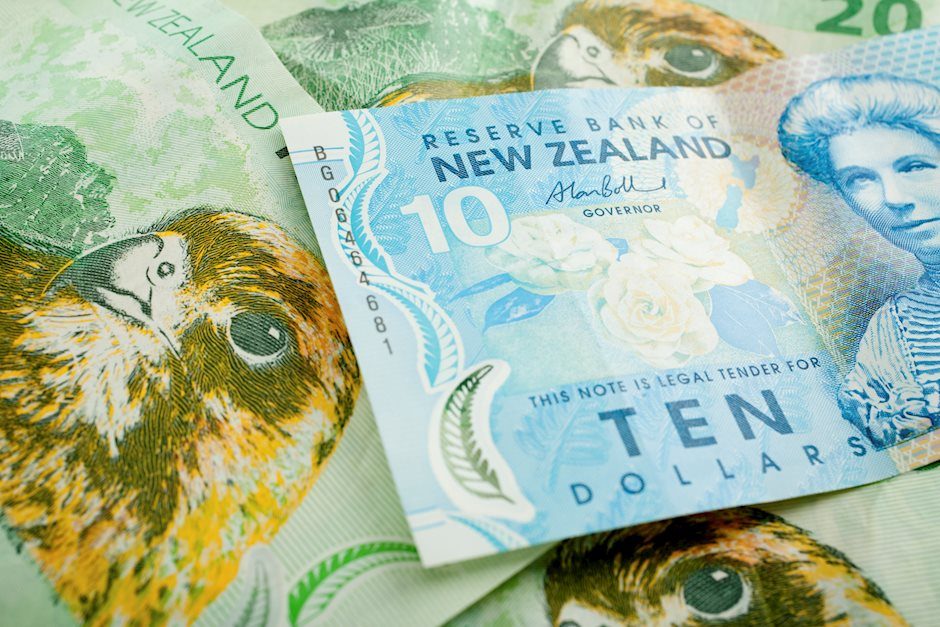NZD/USD holds steady around 0.6150 following an improved Business NZ PSI
- NZD/USD holds ground following the release of an improved Business NZ Performance of Services Index on Monday.
- The Business NZ PSI rose to 45.5 in August from 45.2 in July, reaching its highest level since April.
- The US Dollar receives downward pressure amid uncertainty over the scale of the Fed’s upcoming rate cut.

NZD/USD holds its position following the recent losses from the previous session, trading around 0.6160 during the Asian hours on Monday. Traders are digesting data showing a slight improvement in business activity in New Zealand.
The Business NZ PSI increased to 45.5 in August from 45.2 in July, marking its second consecutive monthly rise and reaching its highest level since April, although it remains in contraction territory.
The New Zealand Dollar (NZD) may struggle due to increasing speculation that the Reserve Bank of New Zealand (RBNZ) will implement aggressive interest rate cuts. After unexpectedly beginning its policy-easing cycle in August, the RBNZ is anticipated to reduce its Official Cash Rate (OCR) at each of its remaining policy meetings for the year.
Traders are expected to await New Zealand’s Gross Domestic Product (GDP) data for the second quarter, scheduled for later in the week, to gain further insights into the Reserve Bank of New Zealand's monetary policy outlook.
Investors are closely watching the upcoming policy decision from the US Federal Reserve (Fed) later this week. The market is divided on whether the Fed will implement a rate cut of 25 basis points (bps) or 50 bps.
According to the CME FedWatch Tool, markets anticipate 48.0% odds of a 25 basis point (bps) rate cut by the Federal Reserve at its September meeting. The likelihood of a 50 bps rate cut has increased to 52.0%, up from 50.0% a day ago.
Traders will closely watch the FOMC Press Conference for insights into the future of US interest rates. If Fed Chair Jerome Powell signals a more aggressive easing approach, it could put downward pressure on the US Dollar, providing a potential boost to the NZD/USD pair.
New Zealand Dollar FAQs
The New Zealand Dollar (NZD), also known as the Kiwi, is a well-known traded currency among investors. Its value is broadly determined by the health of the New Zealand economy and the country’s central bank policy. Still, there are some unique particularities that also can make NZD move. The performance of the Chinese economy tends to move the Kiwi because China is New Zealand’s biggest trading partner. Bad news for the Chinese economy likely means less New Zealand exports to the country, hitting the economy and thus its currency. Another factor moving NZD is dairy prices as the dairy industry is New Zealand’s main export. High dairy prices boost export income, contributing positively to the economy and thus to the NZD.
The Reserve Bank of New Zealand (RBNZ) aims to achieve and maintain an inflation rate between 1% and 3% over the medium term, with a focus to keep it near the 2% mid-point. To this end, the bank sets an appropriate level of interest rates. When inflation is too high, the RBNZ will increase interest rates to cool the economy, but the move will also make bond yields higher, increasing investors’ appeal to invest in the country and thus boosting NZD. On the contrary, lower interest rates tend to weaken NZD. The so-called rate differential, or how rates in New Zealand are or are expected to be compared to the ones set by the US Federal Reserve, can also play a key role in moving the NZD/USD pair.
Macroeconomic data releases in New Zealand are key to assess the state of the economy and can impact the New Zealand Dollar’s (NZD) valuation. A strong economy, based on high economic growth, low unemployment and high confidence is good for NZD. High economic growth attracts foreign investment and may encourage the Reserve Bank of New Zealand to increase interest rates, if this economic strength comes together with elevated inflation. Conversely, if economic data is weak, NZD is likely to depreciate.
The New Zealand Dollar (NZD) tends to strengthen during risk-on periods, or when investors perceive that broader market risks are low and are optimistic about growth. This tends to lead to a more favorable outlook for commodities and so-called ‘commodity currencies’ such as the Kiwi. Conversely, NZD tends to weaken at times of market turbulence or economic uncertainty as investors tend to sell higher-risk assets and flee to the more-stable safe havens.
Author

Akhtar Faruqui
FXStreet
Akhtar Faruqui is a Forex Analyst based in New Delhi, India. With a keen eye for market trends and a passion for dissecting complex financial dynamics, he is dedicated to delivering accurate and insightful Forex news and analysis.

















